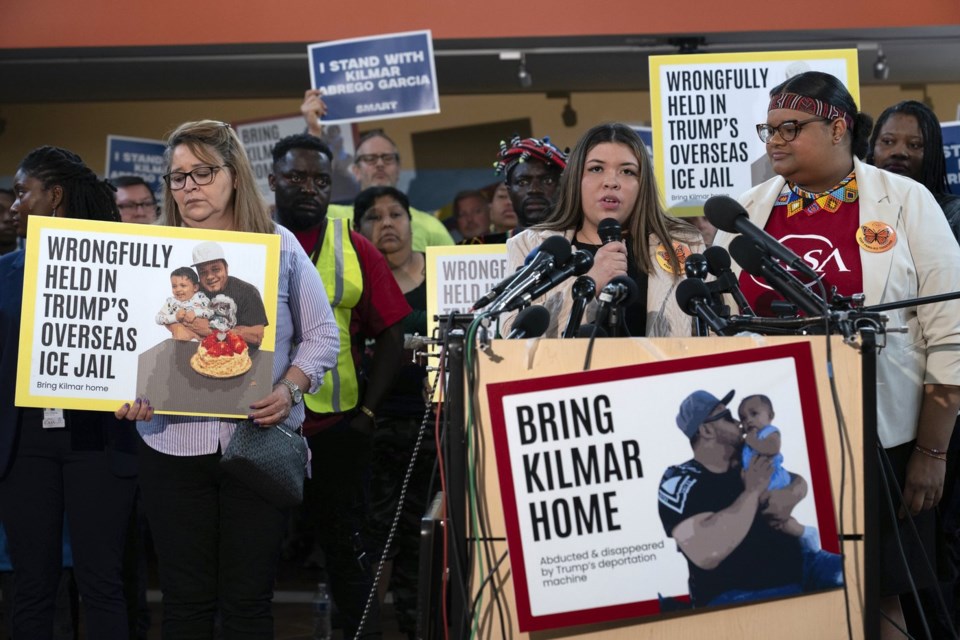GREENBELT, Md. (AP) — A federal judge on Friday ordered the Trump administration to arrange for the return of a Maryland man to the United States after he was mistakenly deported to a notorious El Salvador prison, while a U.S. government attorney was at a loss to explain what happened.
U.S. Immigration and Customs Enforcement expelled Kilmar Abrego Garcia last month despite an immigration judge’s 2019 ruling that shielded him from deportation to his native El Salvador, where he faced likely persecution by local gangs.
Before she issued her ruling, U.S. District Judge Paula Xinis described Abrego Garcia's deportation as “an illegal act” and pressed Justice Department attorney Erez Reuveni for answers, many of which he didn't have.
Reuveni conceded to Xinis that Abrego Garcia should not have been removed from the U.S. and shouldn’t have been sent to El Salvador. He couldn’t tell the judge upon what authority he was arrested in Maryland.
“I’m also frustrated that I have no answers for you for a lot of these questions,” he said.
The judge also questioned why Abrego Garcia was sent to the prison in El Salvador, which observers say is rife with human rights abuses.
“Why is he there, of all places?” asked Xinis, who was nominated by President Barack Obama.
“I don’t know,” Reuveni replied. “That information has not been given to me.”
Reuveni had asked the judge for more time — 24 hours — for the government to possibly broker Abrego Garcia's return. The government's attorney requested “one more chance to do this without court superintendence.”
“That was my recommendation to my clients,” he said. “And, of course, thus far that hasn’t happened.”
“Good clients listen to their lawyers,” the judge said.
The judge also questioned why the U.S. can’t get him back. Reuveni said that was the first question he asked when he was assigned to the case.
“I have not received today an answer that I find satisfactory,” he added.
Abergo Garcia's attorney, Simon Sandoval-Moshenberg, told the judge he was dismayed that the government had done nothing to get his client back, even after admitting its errors.
“Plenty of tweets. Plenty of White House press conferences. But no actual steps taken with the government of El Salvador to make it right,” he said.
Sandoval-Moshenberg brushed aside a question about possibly seeking compensation. He said this case is solely about getting his client back to the US. “It will be a victory when Kilmar is home with his family,” he said.
“An apology would be nice, but I’m not expecting that,” he added.
The judge's ruling came shortly after Abrego Garcia's wife joined dozens of supporters at a rally to urge her husband's immediate return.
Jennifer Vasquez Sura, a U.S. citizen, hasn't spoken to Abrego Garcia since he was flown to his native El Salvador last month and imprisoned. She urged her supporters to keep fighting for her husband “and all the Kilmars out there whose stories are still waiting to be heard.”
“To all the wives, mothers, children who also face this cruel separation, I stand with you in this bond of pain,” she said during the rally at a community center in Hyattsville, Maryland. “It’s a journey that no one ever should ever have to suffer, a nightmare that feels endless."
The White House has cast Abrego Garcia, 29, as an MS-13 gang member and asserted that U.S. courts lack jurisdiction over the matter because the Salvadoran national is no longer in the U.S.
Abrego Garcia’s attorneys have countered that there is no evidence he was in MS-13. The allegation is based on a confidential informant’s claim in 2019 that Abrego Garcia was a member of a chapter in New York, where he has never lived.
Abrego Garcia's mistaken deportation, described by the White House as an “administrative error," has outraged many and raised concerns about expelling noncitizens who were granted permission to be in the U.S.
Abrego Garcia had a permit from the Department of Homeland Security to legally work in the U.S., his attorney Simon Sandoval-Moshenberg said. He served as a sheet metal apprentice and was pursuing his journeyman license.
He fled El Salvador around 2011 because he and his family were facing threats by local gangs. In 2019, a U.S. immigration judge granted him protection from deportation to El Salvador because he was likely to face gang persecution. He was released and Immigrations and Customs Enforcement did not appeal the decision or try to deport him to another country.
Abrego Garcia later married Vasquez Sura. The couple are parents to their son and her two children from a previous relationship.
“If I had all the money in the world, I would spend it all just to buy one thing: a phone call to hear Kilmar's voice again,” Vasquez Sura said. “Kilmar, if you can hear me, I miss you so much, and I'm doing the best to fight for you and our children.”
___
Finley reported from Norfolk, Virginia.
Michael Kunzelman And Ben Finley, The Associated Press



